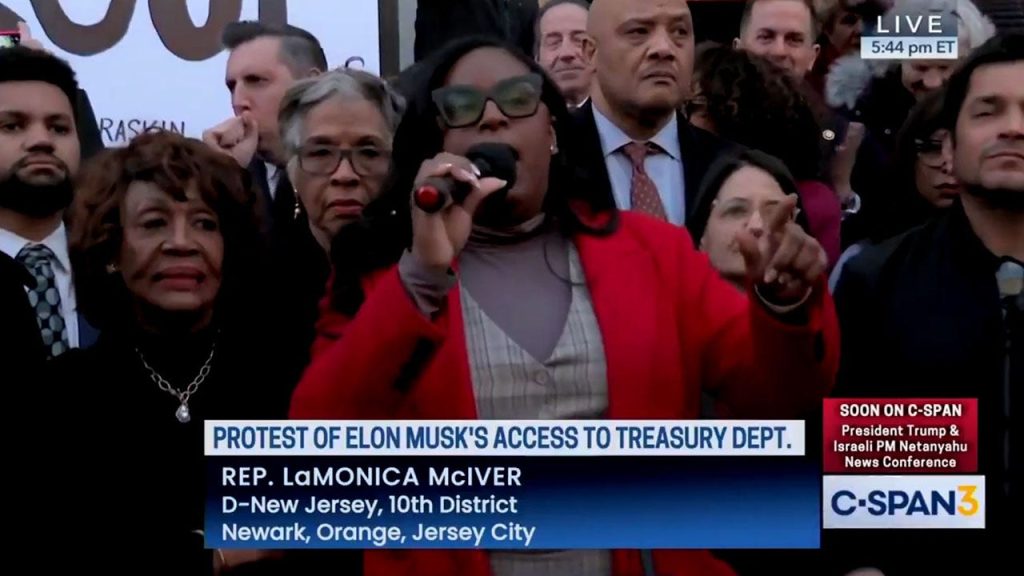The confluence of Elon Musk, the mercurial tech entrepreneur, and the United States Treasury Department, the venerable institution responsible for managing the nation’s finances, has ignited a firestorm of controversy and sparked fervent protests in the streets. At the heart of this tempest lies the Department of Government Efficiency (DOGE), an initiative spearheaded by Musk, and its access to the Bureau of the Fiscal Service (BFS), the Treasury arm responsible for disbursing trillions of dollars annually, including vital payments like Social Security and federal salaries. Democratic lawmakers, fueled by concerns over potential security risks, conflicts of interest, and the sheer magnitude of Musk’s influence, have rallied against this unprecedented partnership, characterizing it as an assault on the integrity of the federal government.
The spark that ignited the protests was a rally organized by progressive groups including MoveOn Civic Action, Indivisible, and the Working Families Party. Rep. LaMonica McIver (D-NJ), a vocal critic of the Musk-Treasury collaboration, delivered a fiery address, calling for resistance and declaring, “We are at war.” McIver’s impassioned plea to “shut down the city” reflected the deep-seated anxieties surrounding the perceived unchecked power granted to Musk. The core of her argument centers on the principle of fairness and accountability, questioning how an individual, regardless of their wealth or influence, can seemingly gain unfettered access to the nation’s financial nerve center. This concern resonates with the broader narrative of money’s influence in politics, raising questions about the potential for undue influence and the erosion of democratic principles.
Adding fuel to the fire, Musk publicly accused the Treasury Department of fraudulent payment practices, alleging that payment approval officers routinely rubber-stamped payments, even to known fraudulent or terrorist organizations. This explosive claim, disseminated via Musk’s social media platform X (formerly Twitter), further exacerbated tensions and intensified scrutiny of the DOGE’s involvement with the BFS. While President Trump affirmed that Musk’s actions require presidential approval, the mere suggestion of unchecked authority granted to a private citizen over such a sensitive area of government operations has raised serious concerns. This dynamic adds a layer of complexity to the already fraught situation, introducing questions about the balance of power between the executive branch, private individuals, and established governmental processes.
The Treasury Department attempted to allay these fears by issuing a letter to federal lawmakers assuring them that DOGE’s access to the payment system is strictly “read-only,” meaning they can view but not alter data. This clarification, however, has done little to quell the anxieties of skeptical Democrats, who remain unconvinced that Musk’s involvement is benign. Sen. Patty Murray (D-WA), Vice Chair of the Senate Appropriations Committee, articulated this skepticism, arguing that even “viewing access” to such a sensitive system is unacceptable. This highlights the fundamental distrust that has permeated the discourse surrounding this issue, with critics questioning the transparency and motives behind the Musk-Treasury collaboration. The “read-only” explanation, rather than assuaging concerns, has been interpreted by some as a superficial attempt to downplay the potential risks.
Rep. Maxwell Alejandro Frost (D-FL) further amplified these concerns, expressing his apprehension about Musk’s potential control over taxpayer funds and the lack of oversight over his activities within the Treasury. Frost’s pointed question – “What is to stop him from stealing taxpayer money? Nothing” – succinctly encapsulates the fear that Musk’s involvement presents a tangible threat to the security and integrity of the federal financial system. This fear is compounded by the lack of clear guidelines and oversight mechanisms governing DOGE’s access and operations within the Treasury. The absence of such safeguards further fuels the perception of unchecked power and raises the specter of potential misuse or abuse.
The protests against Musk’s involvement with the Treasury Department are not isolated incidents but rather a manifestation of broader anxieties about the intersection of private wealth, technology, and government. These anxieties have been further fueled by House Minority Leader Hakeem Jeffries’ pledge to fight President Trump’s agenda “in the streets,” setting the stage for a protracted political battle. The escalating tensions surrounding the DOGE-Treasury partnership underscore the deep partisan divides within the American political landscape and reflect a growing distrust of concentrated power, particularly when it involves individuals with a history of unconventional behavior and a penchant for disrupting established norms. The situation also highlights the inherent challenges of navigating the evolving relationship between government and the private sector, particularly in the rapidly changing landscape of technology and finance. The lack of clear precedent and established protocols for such collaborations further contributes to the uncertainty and anxiety surrounding this issue.

